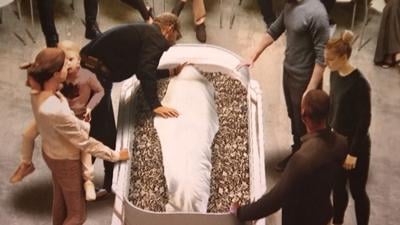MARYLAND - Governor Wes Moore signed legislation Thursday that aims at expanding more environmentally-conscious funeral options for Marylanders.
On May 9th, Moore approved the Green Death Care Options Act to allow death care providers to offer human composting, or natural organic reduction. The Act also permits Maryland crematories to use alkaline hydrolysis, or “water cremation,” instead of conventional incineration of human remains.
Human composting, according to the legislation, accelerates the conversion of a human body into soil. The soil produced through human composting may not be used to grow food for humans or animals, be sold, be combined with commercial or agricultural compost, and can only be used on public or private property with the owner’s prior permission. After the composting process, the soil is returned to the family or donated to conservation projects.
Water cremation is a process uses a combination or water, alkaline chemicals, and heat inside a watertight vessel to accelerate decomposition, leaving behind reduced fragments similar to cremation by incineration. According to green deathcare provider Green Legacy, the process reduces a body to ash without using fossil fuels, providing a more eco-friendly funeral option.
The Green Death Care Options Act establishes requirements and prohibitions for both human composting and water cremation facilities in Maryland. The legislation requires the Office of Cemetary Oversight and the State Board of Morticians and Funeral Directors to adopt regulations to govern these facilities.
“Every year, this new law will give more than 50,000 families with loved ones who die in our state more choices that help the environment,” said Delegate Anne Kaiser (D-Montgomery County) who proposed similar legislation in the past.
With Moore’s signature, the legislation is now set to take effect on October 1st. Maryland now joins eight other states that allow human composting and over twenty that allow water cremation, according to Green Legacy.
In Delaware, similar legislation to legalize human composting was approved by both the State Senate and House in 2024 and is now awaiting Governor John Carney’s signature. Carney’s office previously told WBOC the legislation is undergoing legal review. Human composting legislation was also introduced in Virginia in 2023 but did not progress to consideration outside a House subcommittee.


